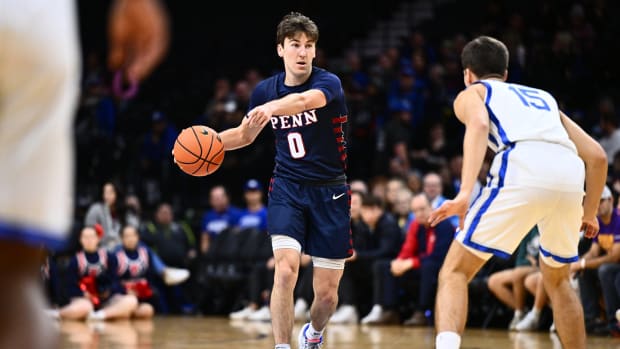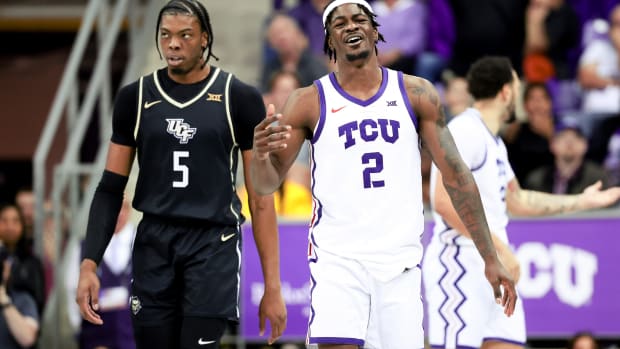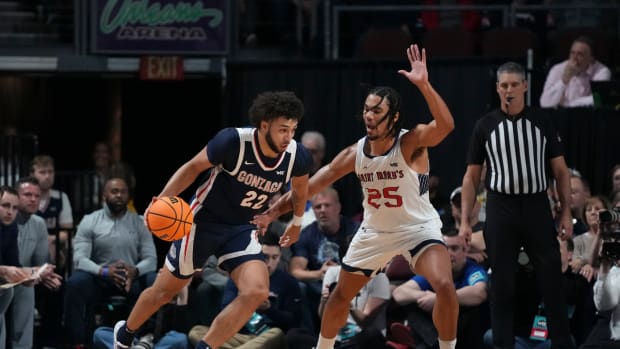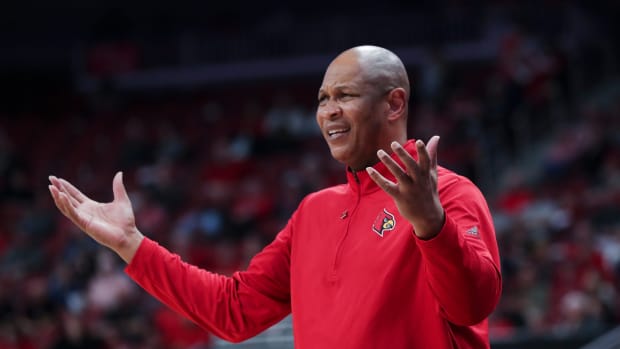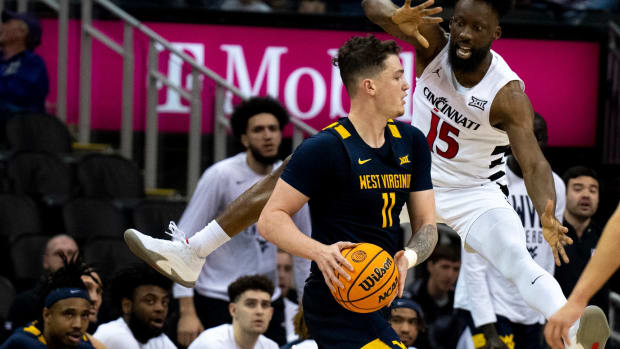Will Gonzaga-Baylor Live Up to the Hype? Five Keys to the Men's Title Game
INDIANAPOLIS — Your wish has been granted: Gonzaga and Baylor are set to duke it out Monday night for all the marbles. It’s been clear for some time that these are college basketball’s two best men's teams. There have been upsets all across the field of 68, and this has been a memorable tournament, but it may still be defined by the quality of this championship game. Coaches Mark Few and Scott Drew are close friends, who tried to schedule a game here in Indy that was, as you may have heard, canceled in December because of COVID-19.
“They got pros, we got pros,” says Baylor guard Jared Butler. “They win a lot of games, we win a lot of games.” Well, there’s only one left. Here are five keys to watch for as Monday night approaches.
1. Championship game or track meet?
These are not just the two best teams in the country, but they’re also the two best offenses. Baylor is the best three-point shooting team in the country (41.2%). Gonzaga makes more of its twos (63.9%) than any team on record. Both teams would love to manufacture some stops, but everyone loves points, and we may end up getting them. Both national semifinals were played uptempo, with Gonzaga needing overtime to beat UCLA, and Baylor leaving Houston unable to catch up. Tempo has become an almost omnipresent buzzword in modern basketball lingo, but this game will really hinge on it—not because of a stylistic clash, but because of the fact these two powerhouses have similar preferences, and the thin margins that might decide the result.
The first item on every team’s list when it comes to planning for the Zags is how to keep them out of transition. The question is whether Baylor can do that and still manufacture enough easy looks of its own. Gonzaga is also the better defensive team, statistically speaking. The Bears will have to decide whether they want to trade blows in a high-scoring affair, or try to take Gonzaga away from its comfort zone a bit. UCLA was able to do a bit of both on Saturday, but that game was still tied at 81 going into overtime. Baylor is going to launch a lot of threes, and rightfully so, but the open ones are easier to find in transition. And if the Bears try to push out quickly, it may play into their opponents’ hands.
For Gonzaga, whether or not to play fast is always less of a question and more of a standard focal point. The Bulldogs share the ball so well and are at their best when playing freely, and Few knows it. They’ll often press early in games to ratchet up the intensity and force mistakes. Baylor is the deepest, most experienced backcourt they’ve faced, but it’ll make sense for the Zags to try and speed it up. The other factor here is that much of Gonzaga’s offense comes in the paint and in transition, two traits that are clearly connected. The Zags don’t shoot the ball as well from distance, and Corey Kispert has made a substandard five of 18 threes in his last two games. The more they can run, the more layups and cuts and chaos buckets they tend to come up with.
Ultimately, both coaches will try to keep their players comfortable. There’s not much time for either team to make sweeping quick-turn adjustments. But the question of aesthetics in this game is a real curiosity.
2. Jalen Suggs and Davion Mitchell
In a game rife with fascinating matchup possibilities, there’s nothing juicier than the prospect of Suggs and Mitchell guarding one another at the point of attack. These are two of the most athletic guards in college basketball, whom most opponents have had no individual answer for. Suggs’s late-game heroics against UCLA will go down in the history books, but he may have a much more complicated time with Mitchell hounding him around the perimeter. Mitchell just won Defensive Player of the Year and earned the nickname “Off Night” for how often he neutralizes opposing guards. They’re both exceptionally strong and fast, and serve as focal points for their respective teams’ ball pressure.
Naturally, whichever guard can wrest control of this matchup will give his team some say over the game’s pace. Much of what Gonzaga can do in transition stems from Suggs, who has quick hands, terrific instincts, covers a ton of ground, and has the focus to make play after play if you let him. His gall and vision as a passer are hard to plan for. But keeping him out of the paint is one place to start if you’re trying to muck up the Bulldogs' rhythm. “I just gotta know when to pick my spots and when to pressure him,” Mitchell says.
Baylor leans on Mitchell even more to bottle up opponents at the point of attack, which buys time and helps cover defensively for the fact that its a smaller team. He’s also the player the Bears rely on to attack downhill and make plays. Suggs will likely try and influence him left—Mitchell is not as good a finisher or passer going to his weak hand—and force him to settle for contested jumpers as much as possible. It could be that the two guards negate each other. From a pure entertainment standpoint, it’s highly promising. “Hopefully, neither get in foul trouble,” says Drew, “because that’s a matchup everyone is going to want to watch.”
3. Baylor’s frontcourt minutes
Part of why this matchup has so much promise is that both teams like to play small, skilled lineups. Baylor is going to have to manage pace, but this may not have to be a total stylistic clash. Still, Gonzaga has a clear advantage up front, with Drew Timme mostly irrepressible throughout the tournament and Corey Kispert always dangerous, even when slumping.
The biggest inflection point in Drew’s late-season rotation has been the distribution of minutes at the four. Mark Vital plays a critical role supplying experience, energy and leadership, but he played just 15 minutes in Baylor’s win over Houston. Matthew Mayer was on the floor for 19, and catalyzed the Bears’ offense in the first half with his shooting. One advantage the Bears has is they should be able to switch a lot of Gonzaga’s screens when Kispert is playing power forward, which is most of the time. But the Vital/Mayer minutes are as close as it comes to swapping offense for defense. Drew has had a good pulse on how to substitute with his group, and he’ll have to determine when to play for stops with Vital, and when to put his foot on the gas with Mayer.
Defending Timme, who’s an expert at finding pockets in the defense and kicking out to shooters, has been a massive undertaking. It’s hard to double him because of everything else Gonzaga has on the court. Jonathan Tchamwa Tchatchoua has been the more effective member of Baylor’s center platoon this tournament, and he and Flo Thamba will have to find a way to slow Timme down (or at least manage their fouls). Baylor’s guards are fast and smart enough to double down on the catch and recover onto shooters, but that’s a dangerous game to play with the way Gonzaga shares the ball.
4. Will there be a Gonzaga hangover?
On the heels of Gonzaga's epic, emotional overtime win against UCLA, you at least have to wonder how the Zags show up out of the gate Monday. They’ll certainly get up for an opponent they’ve been tipped to face all season, but there’s no telling how the proximity of that game might affect them. The Bulldogs, of course, have proven they can run away with any game at any time. But the odds of that happening given all the circumstances swirling seem less. It doesn’t necessarily mean this will be a beautiful game, but expect it to be competitive and tight.
UCLA left Baylor a reasonable blueprint for how to play Gonzaga close. The Bruins ably managed turnovers and did their best to limit second-chance and transition opportunities. The Zags still scored 56 points in the paint, and the Bruins had to sacrifice some opportunities of their own—despite shooting 58%, they didn’t score a single fast break point, and took a lot of midrange jumpers, which don’t always fall like that. It took another out-of-body experience from Johnny Juzang for UCLA to stick around. But the game had 19 lead changes, and the Bruins showed remarkable resolve to hold steady until, literally, the last shot.
Baylor’s hot start against Houston served to illustrate, at the very least, what Gonzaga can’t let happen early in the game. The Bears made 46% of their threes and got 32 points from their bench. It was all flow and confidence, and they built a 25-point lead at halftime. There was no lack of composure from the well-prepared Zags against UCLA, but they haven’t played from behind much at all this season. The Bears have rounded into their best offensive form at the right time and are going to make things tricky. Gonzaga is the favorite and ranked No. 1 for good reason, but they’ll have to earn it one last time.
5. Is it possible for this game to live up to the hype?
Probably not, particularly after the drama that followed Suggs’s game-winner at the buzzer in overtime on Saturday night. It will be hard to top that as the best game of the tournament. But on paper, it’s hard to think of a more compelling pair of teams. If there’s pressure, it falls on Gonzaga, which remains undefeated, and would become a meaningful historical what-if, but still a runner-up, with a loss. The Bears could certainly do with a title, but they already broke a 70-year Final Four streak. Baylor has been sort of the younger sibling all season, with some of its momentum dimmed by a February COVID-19 pause that forced players to get healthy, regain their conditioning, and rediscover their early-season groove. Both teams will send players off to the pros next season, and it’s the end of the line for both groups as we know them.
It may be too much to ask for another hair-raising game, but this tournament has been rife with those. This doesn’t feel like the type of matchup in which one team can run away with it. There’s too much focus on both sides—and enough experience and talent—that it’s hard to see this being a letdown. A hard-fought game with a close finish may be all an objective viewer can really ask for. The excitement jumped the shark already. But this should be the fitting end to a memorable tournament. Anything more than that, of course, would also be acceptable.


